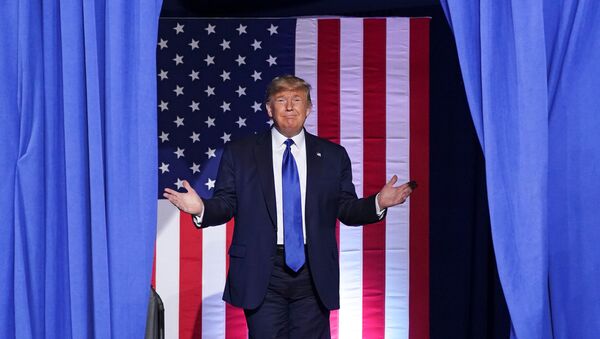President Trump’s defence team opened its presentation on Saturday in an abbreviated session of an impeachment trial, launched at the hands of House Democrats, eight of whom were picked by Nancy Pelosi to address the Senate jury.
As noted by James H. Fetzer, Ph.D., a McKnight professor emeritus at the Duluth Campus of the University of Minnesota and co-founder of Moonrockbooks.com, the main problem with the impeachment proceedings at large is that the charges they are based on – abuse of power and obstruction of Congress – “do not obviously qualify as violations of the US Constitution”, while the latter specifies that impeachment requires "Treason, Bribery, or other High Crimes and Misdemeanours”.
He says the president’s tenure will certainly continue, as even the agreed-upon trial schedule points to this. First of all, the commentator notes that last Monday, despite slightly easing up on the timetable, Senate Majority Leader Addison Mitchell McConnel didn’t change the rules for admitting new witnesses or new documents – something the Democrats have vociferously demanded.
Next were the results of the vote on the presented witnesses, which turned out in POTUS’ favour:
“During a series of votes about specific witnesses, moreover, he prevailed – again and again – on straight 53-47 party-line votes, a powerful affirmation of the widely-held expectation that the President was most unlikely to be removed from office, a result that requires a 2/3 (or 67 vote) majority in the Senate", Fetzer explains at length.
The academic admits that the vote outcome has never been “in serious doubt”, but acknowledges there could have been issues with Mitt Romney, an ardent critic of Trump, or Susan Collins, or Lisa Murkowski, who were arguably inclined to vote in favour of the witnesses.
“As matters now stand, there appears to be no prospect for the introduction of new evidence or testimony during the trial by the Senate", Fetzer says.
Another trump card for the Republicans, the analyst points out, is that the defence is set to begin only after the prosecution's addresses – “absent a motion to dismiss, which may be expected when the Prosecution rests”.
“Such a motion contends that, even if everything the Prosecution has alleged were true, no impeachable offense has been committed and therefore the charges should be dismissed”, Fetzer sums up.
The commentator further addresses the Democrats’ conflicting interests, saying that on the one hand, they have argued that the impeachment case is “overwhelming”, but on the other, that additional witnesses and evidence “are indispensable”.
“They can't have it both ways. The President's tenure in office seems to be secure and his trial may come to an abrupt end just a few days hence”, the professor rounds off.
Such a controversial approach seems to not be the only thing that has been in the political landscape for the past few days.
Earlier this week, during the debate on the prosecution, one of the representatives present at the trial, Adam Schiff, drew controversy and senators’ rage as he referenced a CBS report that the White House had allegedly warned senators not to ditch their support for Trump, saying that otherwise their heads would end up “on a pike”. The senators instantly pushed back at the claims, assuming Schiff had crossed the line in his quoting the ungrounded report.
On 18 December, House Democrats voted along party lines to impeach Trump for his alleged abuse of power as he purportedly pressured the Ukrainian government to open a probe into former US Vice President and Trump's potential 2020 rival Joe Biden along with his son, Hunter Biden, and their allegedly corrupt operations in Ukraine. In line with the US Constitution, the House enjoys the sole power to impeach, which is analogous to an indictment, while the 100-seat Senate, currently controlled by the Republicans, is the only body entitled with powers to remove from office.
Trump blasted the impeachment inquiry, which was launched by the Democrats in September 2019, as a "witch hunt" aimed at overturning the results of the 2016 US presidential election and distracting him from the next pending campaign.


